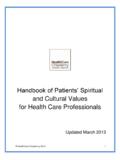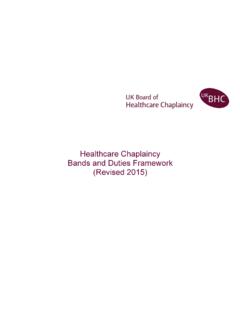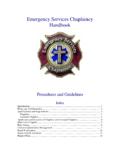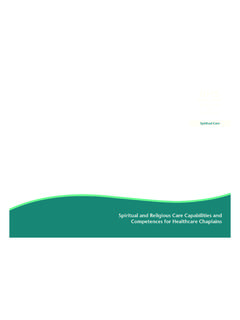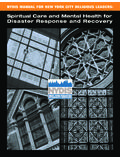Transcription of Chaplaincy and Spiritual Care Services: The Case for ...
1 TOPICS IN INTEGRATIVE HEALTH care [ISSN 2158-4222] VOL 2(2) June 30, 2011 1 | P a g e Research Chaplaincy and Spiritual care services : The Case for Muslim Patients Wahiba Abu-Ras, Address: 1 Assistant Professor, School of Social Work, Adelphi University, Garden City, NY 11530. Email: Wahiba Abu-Ras, * - Topics in Integrative Health care 2011, Vol. 2(2) ID: Published on June 30, 2011 | Link to Document on the Web ABSTRACT Religion and spirituality are the first, and sometimes the only available sources of comfort for many hospital patients facing difficult and stressful times.
2 Since Chaplaincy is typically practiced along Judeo-Christian lines, other Spiritual perspectives receive less attention. This study assesses the existing Chaplaincy care services available for Muslim patients as perceived by two different groups, 33 Muslim and non-Muslim chaplains and by 56 directors of Chaplaincy departments at New York City hospitals. A mixed-methods approach was used, including a cross-sectional survey and in-depth interviews. The results indicate that Muslim patients religious needs may be underserved, and that they may not receive appropriate Chaplaincy care . These results may provide a better understanding of the challenges that other immigrants and minority groups face when receiving medical care , and of the need for quality Spiritual care for these communities.
3 INTRODUCTION Religion, spirituality, and faith provide the majority of Americans with a healthy means of coping with adversity, giving them the ability to recover from difficult events and Research indicates that religion provides psychological benefits and important social Several studies show that the healthy practice of one s faith usually correlates with positive mental and physical health,5-8 both of which are associated with the prevention of illness across divergent religious communities 4,9 TOPICS IN INTEGRATIVE HEALTH care [ISSN 2158-4222] VOL 2(2) June 30, 2011 2 | P a g e Approximately 90% of hospitalized patients within the United States indicate they use religion to cope with illness, and over 40% say it is the most important factor in their struggle for Although there is no definitive link between religious guidance and health, some studies suggest that Chaplaincy plays an important role in helping patients cope with physical In its accreditation of hospitals in the US, The Joint Commission requires hospitals to respect the patient s cultural and personal values.
4 Beliefs and preferences and to accommodate the patient s right to religious and other Spiritual services . 13, Spiritual care integrates the body and the soul and, as such, its provision by chaplains is critical in identifying a model for successful patient outcomes. In an increasingly pluralist society such as that of the US, the expectation is that the diverse needs of all faith communities will be met. However, in the US, the predominantly Christian population tends to benefit most from Chaplaincy services , while the Spiritual needs of other minority religious groups often are not adequately This trend may reflect a lack of diversity within Chaplaincy services , despite the diverse hospital patient populations they serve.
5 VandeCreek and Lyon17 found that a patient s level of satisfaction increases when chaplains respond to diverse patient concerns in a sensitive manner. However, when a chaplain of a different religious denomination was asked to pray, the patient deemed the prayer to be inappropriate, even when the Chaplaincy visit helped the patient address important medical, nursing and administrative Hamza18 supported this finding by noting that the lack of knowledge about minority patients Spiritual needs, or the existence of ethnic differences between the chaplain and patient, can negatively impact this relationship and its The ability to meet the needs of all patients is important, not only for the well-being of the patients themselves.
6 But also for the entire hospital staff that seeks to maximize patient satisfaction and foster positive patient relations. The Case of Muslim Patients in New York City Currently, there are no accurate data about the exact number of Muslims in the US. However, some have estimated that Muslims are the second largest religious group in the world and one of the most rapidly-growing religions in the United States, after Christians,18 with census estimates ranging between million18 and 7 The annual growth rate of this population is 6%, compared to the average national rate of , and the Muslim population is expected to double by the year Muslims also tend to be more concentrated in urban In 2000, million of 8 million New York City residents reported being foreign-born.
7 These immigrants come from diverse ethnic backgrounds, in numbers unmatched by any other US In New York City, there are about 600,000 Muslims,23 and they are almost equally represented by three major regional or ethnic groups: African American, Middle Eastern (including Arabs and Persians), and South Asian (mostly Pakistanis and Indians).24 These diverse groups signify a wide spectrum of religious practices, adherence, rituals, and traditions. However, their core Islamic worship and theology are remarkably uniform compared to many For example, Muslims who practice Islam adhere to all or to most of the five pillars of Islam, including utterance of the Shahada (the Islamic statement of faith), daily prayers five TOPICS IN INTEGRATIVE HEALTH care [ISSN 2158-4222] VOL 2(2) June 30, 2011 3 | P a g e times each day, fasting during the holy month of Ramadan, giving Zakat (charity)
8 , and pilgrimage to Many Muslims consider their religion and beliefs to be the most important aspect of their Spiritual essence,26 especially as they relate to daily practices, health care needs, medical ethics, and end-of-life treatment choices. The chaplain thus serves as a cultural broker, guiding patients toward health care decisions that are congruent with their beliefs and Spiritual needs. In today s highly technological health care system, ethical questions regarding patient care arise frequently. Many Muslim patients draw upon Islamic legal tradition and religious scriptures for guidance when making difficult decisions, including whether to continue aggressive treatment, participate in family planning, or receive or donate Professional chaplains who are knowledgeable about Muslim traditions may serve as Spiritual care liaisons between patients and their families, and staff members who need to understand the specific needs and values of Muslim ,15 Racism and discrimination in the US affect many immigrants from non-English-speaking communities.
9 However, the experiences of the Muslim community are exceptionally different for several reasons. Most Muslims have experienced religious discrimination, a problem that has become endemic since the 9/11 As a result of the political and social climate in the United States, and particularly in New York City, many Muslims feel further marginalized and are afraid to utilize government services , including health care This prompts many American Muslims to use religion and faith as a source of support and a means to , 33-34 In addition, mental health research has demonstrated that American Muslims are more likely to report emotional or psychosocial problems to Spiritual leaders.
10 Imams (Muslim leaders), and chaplains than to mental health ,34 While most empirical studies have thus far focused on Judeo-Christian religious populations, the following study is the first to examine and assess existing Chaplaincy care services for Muslim patients, as perceived by directors of Chaplaincy departments and by both Muslim and non-Muslim chaplains in New York City hospitals. This study also highlights the major barriers Muslim patients face when accessing services in hospitals and health care settings within an urban region, and identifies ways to minimize these barriers as suggested by the study participants.
